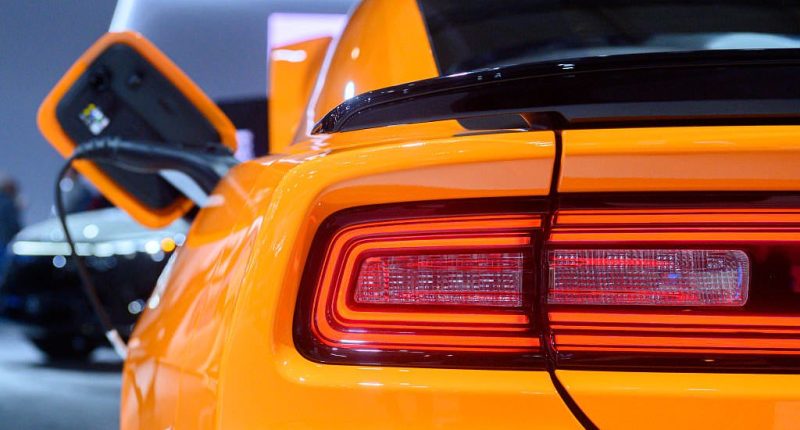Share this @internewscast.com

Shoppers are rejecting Dodge’s electric reboot of a classic car — but the automaker is blaming tariffs for a new year-long delay. The company said the entry-level Charger Daytona R/T EV won’t arrive at U.S. dealerships in 2026 as originally planned. Bosses say the model has been ‘postponed’ as it reevaluates US. trade policies — raising the possibility of a 2027 launch instead.

The more expensive Scat Pack EV — priced in the mid-$70,000s — is still on sale. Dodge also plans to introduce gas-powered six-cylinder and four-door Charger variants by the end of 2025. Dodge’s CEO, Matt McAlear, said it delayed the entry level EV’s ‘as we continue to assess the effects of US tariff policies.’

The Charger is subject to President Donald Trump’s 25 percent tariff: it’s built in the Windsor Assembly Plant in Ontario, Canada. But the bigger issue may be demand. Since launching the Charger EV earlier this year, Dodge has sold fewer than 2,000 units — a far cry from expectations. The first Chargers started rolling off factory lines in January, so the low figure may be partially due to early supply constraints.

Still, fewer than 2,000 units is far weaker demand than the company anticipated when it made its big bet. Dealers currently hold around 3,500 unsold units. For years, the Charger coupe and Challenger sedan were Dodge’s two most recognizable nameplates. Both were brawny, burbling muscle cars that largely appealed to testosterone-fueled American enthusiasts.

Then, in March 2024, Dodge made a shocking move: it axed the Challenger nameplate and committed to offering the Charger as an EV. The battery-powered model promised instant torque, stored 670 horses in the powertrain, and projected engine-like sounds designed to mimic a gas-powered growl. These changes cut against the grain of the typical Charger buyer — many of whom remain skeptical of the EV transition.

‘Americans who buy a Charger don’t want an EV,’ one driver said in a Reddit post. ‘This entire product was a really strange decision.’ Dodge’s parent company has also had a rough ride recently. The automaker has drawn criticism from the Trump administration due to its European ownership. Dodge — which is part of the legacy American brand that owns Chrysler, Jeep, and Ram — has long been considered part of the Detroit ‘Big Three’ alongside Ford and GM.

But in 2021, Dodge became part of Stellantis, a multinational auto conglomerate headquartered in the Netherlands. ‘Let’s face it, it’s owned by Fiat, and most of the engines that go into the cars that are assembled here are from Italy,’ President Donald Trump’s senior advisor on trade, Peter Navarro, said on CNN. ‘I mean, that’s not an American company.’

The international ownership has made many of its vehicles extremely susceptible to the administrations 25 percent tariffs. Stellantis was the first major company to announce tariff-related American job cuts . It also had to make a humiliating U-turn and reshoot TV ads that said cars were made in the US when they were not. At the same time, the company is seeing lagging interest in its current vehicle lineup.

In February, Stellantis reported a staggering 70 percent drop in profits for 2024. Dodge serves as a prime example of the company’s struggles. Once known for a robust portfolio of muscle cars, sedans, trucks, and minivans, the brand has shrunk dramatically. Its pickup and commercial vehicle division was spun off into the separate Ram brand, and today Dodge sells just three vehicles: the Charger EV, the Hornet, and the Durango.

The Hornet, in particular, has consistently topped the ‘days on lot’ metric — a measure of how long cars sit unsold at dealerships. In 2024, Dodge had a supply of Hornets that could last more than 400 days, meaning the brand could halt production for over a year and still have inventory to sell.








